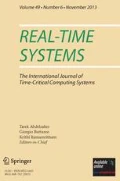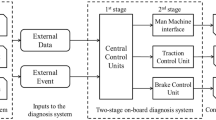Abstract
In this paper we present five new on-line algorithms for servicing soft aperiodic requests in realtime systems, where a set of hard periodic tasks is scheduled using the Earliest Deadline First (EDF) algorithm. All the proposed solutions can achieve full processor utilization and enhance aperiodic responsiveness, still guaranteeing the execution of the periodic tasks. Operation of the algorithms, performance, schedulability analysis, and implementation complexity are discussed and compared with classical alternative solutions, such as background and polling service. Extensive simulations show that algorithms with contained run-time overhead present nearly optimal responsiveness.
A valuable contribution of this work is to provide the real-time system designer with a wide range of practical solutions which allow to balance efficiency against implementation complexity.
Similar content being viewed by others
References
BakerT.P., “Stack-Based Scheduling of Real-Time Processes,” The Journal of Real-Time Systems 3(1), 1991, pp. 67–100.
Buttazzo, G., and Stankovic, J., “RED: A Robust Earliest Deadline Scheduling Algorithm,” Proc. of 3rd International Workshop on Responsive Computing Systems, Austin, 1993.
Chen, M., and Lin, K., “Dynamic Priority Ceilings: A Concurrency Control Protocol for Real-Time Systems,” The Journal of Real-Time Systems, 2, 1990.
ChettoH., and ChettoM., “Some Results of the Earliest Deadline Scheduling Algorithm,” IEEE Trans. on Software Engineering, 15(10), 1989, pp. 1261–1269.
ChettoH., SillyM., and BouchentoufT., “Dynamic Scheduling of Real-Time Tasks under Precedence Constraints,” The Journal of Real-Time Systems 2, 1990, pp. 181–194.
Davis, R.I., Tindell, K.W., and Burns, A., “Scheduling Slack Time in Fixed Priority Preemptive Systems,” Proc. of Real-Time Systems Symposium, 1993, pp. 222–231.
GhazalieT.M., and BakerT.P., “Aperiodic Servers In A Deadline Scheduling Environment,” The Journal of Real-Time Systems, 9, 1995, pp. 31–36.
Lehoczky, J.P., and Ramos-Thuel, S., “An Optimal Algorithm for Scheduling Soft-Aperiodic Tasks in Fixed-Priority Preemptive Systems,” Proc. of Real-Time Systems Symposium, 1992, pp. 110–123.
Lehoczky, J.P., Sha, L., and Ding, Y., “The Rate Monotonic Scheduling Algorithm: Exact Characterization and Average Case Behaviour,” Proc. of Real-Time Systems Symposium, 1989, pp. 166–171.
Lehoczky, J.P., Sha, L., and Strosnider, J.K., “Enhanced Aperiodic Responsiveness in Hard Real-Time Environments,” Proc. of Real-Time Systems Symposium, 1987, pp. 216–270.
LiuC.L., and LaylandJ.W, “Scheduling Algorithms for Multiprogramming in a Hard real-Time Environment,” Journal of the ACM 20(1), 1973, pp. 40–61.
Mok, A.K., Fundamental Design Problems of Distributed Systems for the Hard-Real-Time Environment, Ph.D. Dissertation, MIT, 1983.
Ramos-Thuel, S., and Lehoczky, J.P., “On-line Scheduling of Hard Deadline Aperiodic Tasks in Fixed-Priority Systems,” Proc. of Real-Time Systems Symposium, 1993, pp. 160–171.
SpruntB., ShaL., and LehoczkyJ.P., “Aperiodic Task Scheduling for Hard-Real-Time Systems,” The Journal of Real-Time Systems, 1, 1989, pp. 27–60.
Author information
Authors and Affiliations
Rights and permissions
About this article
Cite this article
Spuri, M., Buttazzo, G. Scheduling aperiodic tasks in dynamic priority systems. Real-Time Systems 10, 179–210 (1996). https://doi.org/10.1007/BF00360340
Issue Date:
DOI: https://doi.org/10.1007/BF00360340




